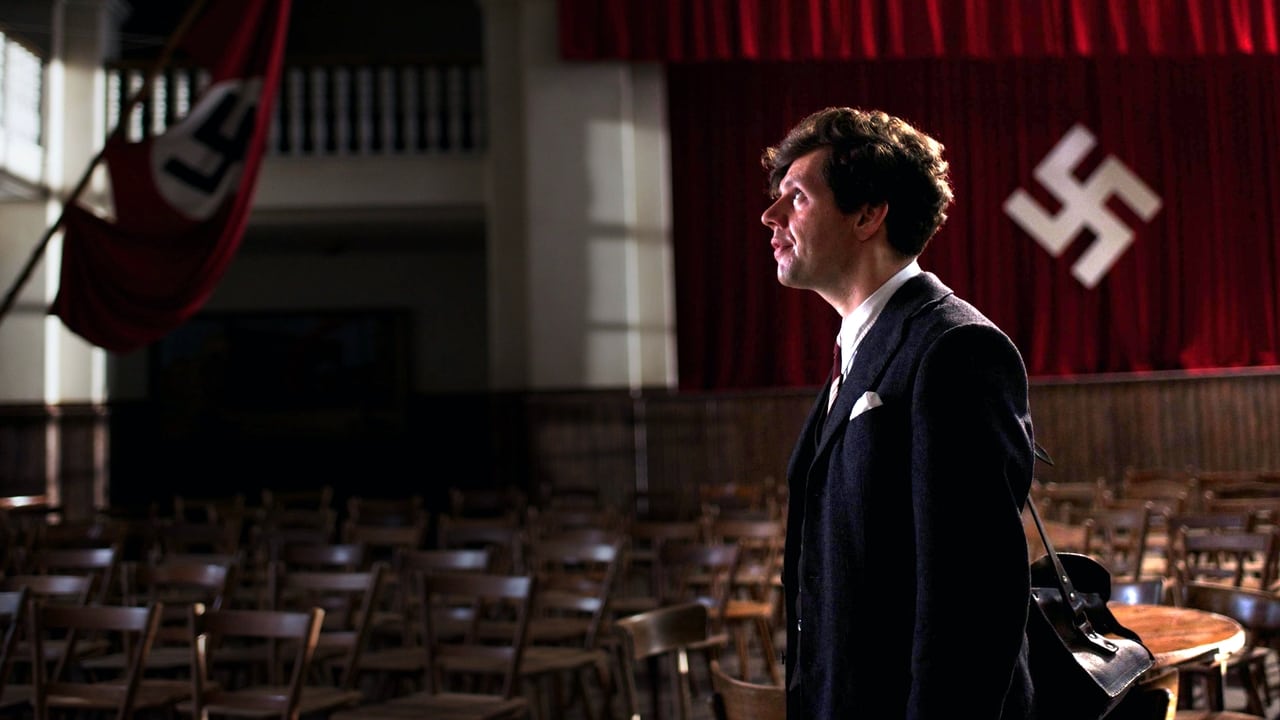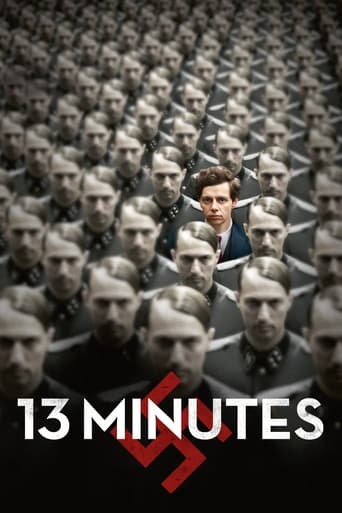



Tied for the best movie I have ever seen
Better Late Then Never
An Exercise In Nonsense
A terrific literary drama and character piece that shows how the process of creating art can be seen differently by those doing it and those looking at it from the outside.
View MoreActually, it's a really good movie, but the "5" is for totally repugnant graphic violence. It's not necessary to smear the viewer with torture depiction in order to make your point and tell a story. The more I think about it, the story could have been told heroically from a completely different perspective. I read the "true" story after watching the movie. Rather than make most of the story about the torture and confession, the story could have been told from the point of view of the ingenious months of planning, building, and particularly the installation of the bomb. The movie makes it look like the bomb was installed in one night, but instead, it really took weeks, with repeatedly difficult trips (over 30) to the location, a remarkable feat that the movie only hints at. The fact that after months of planning, design, assembly, and installation, Elser missed Hitler by only 13 minutes is astounding.Maybe the fault is in the limited information conveyed by the subtitles. There are confusing moments in the movie that are easily cleared up by just reading the Wikipedia bio of Elser.
View MoreI was lucky enough to see this film on the big screen during the brief period that it played locally. I didn't know any more about it than the basic subject, and I'm glad about that, because the film got some strangely negative reviews in the U.S. Some critics seemed to complain that it wasn't a Jason-Bourne-style thriller. Instead, it's a careful portrait of one man, and shows how both he and his village were changed by political events in their country. I was surprised to find out the movie was originally released in Germany in 2015, because it included so many events that are happening in 2017 America: left-vs-right street violence, religious intolerance, disagreements about which party represents workers, and government officials who think torture is the best way to get the truth. The photography is beautiful and the storytelling clear but unusual. For example, an explosion is shown from a far-off POV, as a small part of a beautiful landscape shot, instead of up close to the blast. The production design is thoroughly convincing (though I may not be a perfect judge of the authenticity of period films set in Germany), and the settings are lifelike. When a character swims in a lake, it reminds you of just what that feels like. The violence works that way, too. Though it's not gruesomely detailed and exposed in a Tarantino kind of way, you'll probably feel it more. The acting is excellent overall. The leading actor comes across as more babyfaced and less worldly than the real Georg Elser, just judging by their respective looks, but he creates a memorable character that is never a stereotype, yet is not merely a movie eccentric. Though the brutality of the Nazis' actions is never toned down, there are still moments when some of them display a believably human sense of doubt. A minor character has his own complete arc, from downtrodden village man to local Nazi leader to someone unsure if the party has gone too far. I completely disagree with one reviewer who thought the movie was too sentimental. It doesn't lionize even its main protagonist, and shows the problematic aspects of his violent political act.Afterward, I read about the real Georg Elser, and I was disappointed at a few of the fictional changes. I was sorry they cut out the character of Georg's sister Maria, who seems to have been important in real life, and since everything is seen through Georg's eyes, and he has limited knowledge, and we don't hear about some of the other people the Nazis persecuted and even murdered after the bombing. But you can read about this. I never would have known the story was worth investigating further if I hadn't seen this compelling film.
View MoreIn November 1939, Georg Elser's (Christian Friedel) attempt to assassinate Adolf Hitler fails , and he is arrested . During his confinement , the man who recognized the danger emanating from Hitler sooner than many others recalls the events -by means of flashbacks- leading up to his plot and his reasons for deciding to take such drastic action . As it relates the background of the failed attack in the Bürgerbräukeller . As the exciting story takes us from his early years in the Swabian Alps - when National Socialism arrived in his hometown . Meanwhile , Gestapo detains his girlfriend Elsa (Katharina Schüttler). At the end takes us to his last days at the Dachau concentration camp .This acceptable and intriguing movie deals with the resistance fighter George Elser , a man who could have changed world history and saved millions of human lives. His life and the famous event from how was orchestrated the dangerous , risked plot was professionally directed by Oliver Hirschbiegel . The film is correctly based on true events and real Nazis characters and well played by a fine plethora of German actors such as Christian Friedel , Katharina Schüttler and Burghart Klaußner as Nebe . The movie gives an actual , suspenseful, emotional portrayal of Georg Elser ; packing intense drama , thrills , chills , brutal tortures and portentous interpretations . There is a meticulous and cruelty description of tortures . Torture scenes being depicted in great detail and crudity , though it results to be shocking and excessive , displaying a detailed exploitation violence . Efficiently directed by Oliver Hirschbiegel , though with no originality ¨. At the beginning , Oliver directed some episodes of TV series as Kommissar Rex and Baby Rex . His greatest hit smash is , of course , the magnificent ¨Downfall¨ and working for Hollywood in : ¨The invasion¨ with Nicole Kidman and shooting ¨Five minutes of heaven¨ . His greatest hits were ¨The experiment¨ and ¨The downfall¨.The picture is well based on historical events , these are the followings : on 8 November 1939 Elser carried out a failed attempt to assassinate Hitler and other high-ranking Nazi leaders , he , then is detained . A time bomb that Elser constructed and placed near the speaking platform failed to kill Hitler, who left earlier than expected, but killed eight people and injured over sixty-two others. Unknown to Elser, Hitler had initially cancelled his speech at the Bürgerbräukeller to devote his attention to planning the imminent war with France, but changed his mind and attended after all. As Hitler ordered Heinrich Himmler to put Arthur Nebe , head of Kripo (Criminal Police), in charge of the investigation into the Munich bombing. Himmler did this, but also assigned total control of the investigation to the chief of the Gestapo, Heinrich Müller. Müller immediately ordered the arrest of all Bürgerbräukeller personnel, while Nebe ran the onsite investigation, sifting through the debris. Nebe had early success, finding the remains of brass plates bearing patent numbers of a clock maker in Schwenningen, Baden-Würtemberg. Despite the clear evidence of the German make, Himmler released to the press that the metal parts pointed to 'foreign origin' . Himmler offered a reward of 500,000 marks for information leading to the capture of the culprits, and the Gestapo was soon deluged with hundreds of suspects. Elser was transferred from Múnich prison to to Berlin Gestapo Headquarters . His parents, siblings and their spouses, together with his former girlfriend Else Härlen, were taken by train to Berlin to be held in Moabit prison and then in the grand Hotel Kaiserhof . His mother, sister Maria Hirth, brother-in-law Karl Hirth and Else Härlen were also cruelly interrogated . Apart from Maria Hirth and her husband, who were considered accomplices and imprisoned for over one year, the family members and Else Härlen were allowed to return home . Elser was held as a prisoner for over five years until executed at the Dachau concentration camp.
View More'Elser' deals with the famous failed attempt on Hitler's life, dated November 8, 1939. Taking place in a Munich beer hall, where the bomb's time setting missed Hitler with a margin of only 13 minutes. A true near-miss in world history.This well-made German film focuses on the psychology of the assassin, the German Georg Elser. And for this director Oliver Hirschbiegel uses a highly original method: showing flash-backs about Elser's life with high frequency, while at the same time continuity & balance is provided by a female voice, telling Elser's story.Using this method, Hirschbiegel succeeds to picture Elser's personality convincingly. Making 'Elser' to a film worth watching.
View More